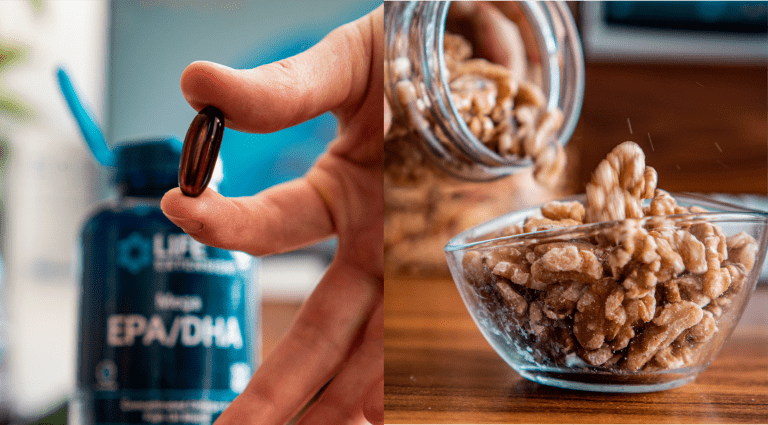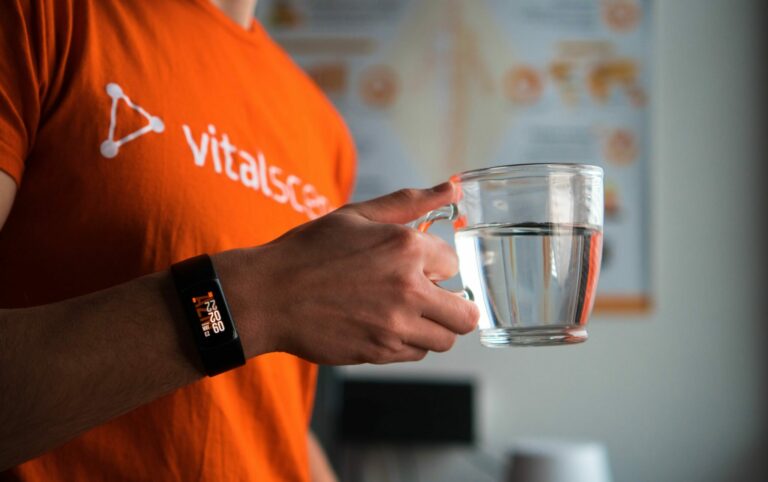7 Effects of Intermittent Fasting on Health, Aging, Fat Loss and Cellular Cleansing
Intermittent fasting is one of the most popular trends in the health & wellness industry. From weight loss, anti-aging, and cognitive function to lower inflammation, it can be effective. But what is intermittent fasting for real?
Take it from a long-term fan who has been fasting for the past 5 years (me, although I’m only 23) and blame it on my desire to increase growth hormone secretion. This is the holy grail on how intermittent fasting works, its effects, and benefits on the body. Enjoy!
What is Intermittent Fasting
Intermittent Fasting is pretty self-explanatory. Intermittent means something is not continuous, but intermittent, occurring at intervals. Fasting is abstinence from eating food. Intermittent fasting means you are eating and not eating at specific time intervals during your day.
It’s not that much about what you eat, but when you eat it. It is about not eating food for certain intervals of time. This is thought to promote many health benefits if done properly. We are talking weight loss, anti-aging, cellular cleansing or detox, increase in growth hormone, improvement in insulin sensitivity, etc. (you get the idea)
But why would I starve myself you might ask? Well, there is a massive difference between starvation and intermittent fasting, check it out.
How Does Intermittent Fasting Work?
Intermittent fasting, by extending the time you don’t consume foods can lead to more optimal environment for the body, allowing it to heal, regenerate and recover better. It stimulates autophagy which removes dysfunctional cells, reduces insulin spikes and decreases inflammation levels.
Can I drink coffee or tea during intermittent fasting?
Fortunately, yes. Even zero-carb, fat-enriched foods aren’t excluded by fasters. But usually, during intermittent fasting you want to avoid calories, but especially sugars. This means drinking tea of coffee, of course unsweetened (sorry) are allowed. If you go for the keto option, which still isn’t a bad idea, so-called sugar-fasting, you can only eat fats, like butter enriched coffee with MCT oil. Also, if you wonder whether 1 mg of sugar will break your fast, it doesn’t quite work like that. It’s more of how much you’ll break your fast, it isn’t like turning a switch. So limiting all calories, especially sugars is technically fasting.
Intermittent fasting vs low-carb diet?
There are numerous effects that are quite similar when you compare fasting with LCHF. Basically extended fasting will get your body in a state of ketosis, where you burn fats for fuel. Both IF and LCHF are keeping low sugar intake, which keeps low insulin levels resulting in lower inflammation, fat burning and stable energy.
Will intermittent fasting reduce belly fat?
Yes, intermittent fasting can aid in burning fat. The idea is that by reducing glucose, your body will have to shift to using ketones or fats for fuel, by breaking its own fat tissue. IF was shown to burn visceral (fat around your organs and belly) fat and subcutaneous fat.
Intermittent fasting vs. Starvation
Our primal ancestors didn’t have the fancy lifestyle we have. Food was something they haunted for, not something they got whenever they wanted. Their supermarket was nature, and they had to find ways to survive when they couldn’t eat. Some of them starved, and some of them fasted, but what’s the difference?
Starvation is a continuous and severe caloric restriction of calorie intake deficiency, which is below the optimal levels to support our vital functions. This means not eating sufficient food for extended periods, resulting in stunted growth, severe weight loss, brain shrinkage, muscle loss, and bone loss. During starvation, the body eats or breaks down functional and vital tissues like bones, muscles, and organs to produce energy.
During intermittent fasting, we only expose ourselves to short-term food abstinence, which has numerous health benefits. It can promote a sort of internal cellular cleansing or autophagy, during which the body breaks down dysfunctional cells and flushes out toxins and waste products.
Simply put, not eating for 16 hours won’t eat your vital organs, but may burn some of the excess fat around your belly. So far, sounds good aye?

Types of Intermittent Fasting
There are different fasting protocols that can have different effects on health. While some are more suitable for autophagy, inflammation reduction, and longevity promotion, others are better to boost growth hormone, improve athletic performance and shred extra fat. We’ll discuss these in-depth in another article, but let’s see the most common types.
16:8 Fasting
5:2 Fasting
Eat-Stop-Eat
4 Hour Window
This is the regular 2/1 ratio of fasting to eating. You basically don’t eat anything caloric during the 16-hour window (except water, tea), and eat all your meals in the 8-hour window. This is my favorite and by far the most practical and easy to sustain. All you have to do is skip breakfast or dinner. I’d skip breakfast over dinner 100%, because you’ll have trouble sleeping hungry (ghrelin secretion) and with no carbs in the morning, you’ll be more alert, focused, and energized (more blood for your brain, less for your belly).
This is also a pretty popular method where we eat regularly for 5 days, and usually, we significantly restrict our caloric intake to approximately 500 kcal, mainly focusing on whole foods, juices, etc., for two days. This diet has been shown effective for weight loss.
This method may be a bit extreme for someone, as it involves eating normally but having 1-2 days of complete abstinence from food. Your body’s supposed to detox and achieve autophagy, clear toxins, waste products, and dysfunctional cells. However, for people with metabolic or blood sugar regulation problems, this can be a big no-no.
Also known as the Warrior Diet, practiced by Ori Hofmekler, a famous fitness expert. It only involves eating raw, clean, and whole foods like veggies and fruits throughout the day, and having one large meal (dinner usually) packed with nutrients, always kept in the same 4-hour window.
Which Intermittent Fasting Protocol is the best?
There isn’t one significant method of fasting that outperforms all the others. Longer fasting protocols like 5-days have been shown to skyrocket HGH secretion up to 300%, (1) while 16/8 shorter fasting in conjunction with resistance training showed a decrease in fat-free mass, muscle gains, and maximal strength. (2) Periodic fasting of 2-7 days once per month may have a positive effect in slowing down cellular aging, lowering inflammation, and preventing diseases. (3)
7 Effects of Intermittent Fasting
As we’ve seen, fasting was a part of the lifestyle of our primal ancestors. There are many benefits from intermittent fasting which we’ll talk about. Keep in mind some of those are done in animal models, some in humans.
Either way, there are many effects on different biomarkers like cholesterol, growth hormone, inflammation markers, etc. which give us a good picture of why fasting can stimulate autophagy, and how it can help us be healthier, stronger, and live longer.
1. Increase in Human Growth Hormone
(Not Necessarily Muscle Anabolism)
The fountain of youth, the elixir of life, and the master of muscle gains, HGH. HGH is known as the main muscle growth and anti-aging or weight-loss hormone, and while some of that is true, there are so many other factors affecting these effects.
HGH is an important hormone involved mainly in the growth, development, metabolism, regeneration, and building of tissues. It has a profound effect on organs, bones, muscles, and the brain. It up-regulates IGF-1 production which has a profound effect on metabolism. It increases protein synthesis, and amino-acid uptake and reduces muscle degradation. (4)
Unfortunately, as impressive as it sounds, HGH from fasting might not be the most convenient way to grow muscles. Why? Long-term 26-day fasting has been shown to skyrocket HGH by 1250%. Yes, sure. But HGH was increased to stimulate protein synthesis and spare the muscle, it is an automatic response for survival. Not eating for so long will eventually result in muscle loss, hence why our body produces such excess amounts of HGH. (5)
However, the good news is fasting for 16 hours can produce a smaller, but still significant rise in HGH levels. The body won’t eat its own muscle tissue for energy during such a short period of fasting (16h). This means a high protein diet, with 16 hours of fasting may result in greater muscle anabolism.
Extra Research: HGH, Anabolism, and Calories
The problem with long fasting and muscle anabolism is the inability to eat as many calories as we need, to support muscle anabolism. Mostly, people lose weight on intermittent fasting due to reduced caloric intake. If you’re training with proper volume and eating a high-protein diet with a caloric surplus (which is harder to do when fasting) then your ability to gain muscle won’t be hindered.
On top of that, increasing HGH with fasting has many other potential benefits. Many of the benefits shown below, come as a result of increased HGH secretion. Human growth hormone can improve regeneration, speed up fat loss, promote longevity and anti-aging, increase VO2max, and aid in cellular repair. (6)
2. Accelerate Weight Loss and Fat Loss
The main reason behind the weight loss and fat loss effects of intermittent diet lies in glucose metabolism, insulin hormone regulation, and potential caloric restriction.
First of all, let’s check caloric restriction. Many people don’t even try to eat fewer foods, but due to the restricted eating window, they aim for less food because they can skip one meal (breakfast usually). After skipping that one hunger trigger you’ve already reduced the calories of your first meal.
Alternate-day fasting, the 5:2 diet, or even time-restricted eating were all shown to be effective for weight loss. Participants in this study reduced their weight by 1-8%, partially due to the reduced caloric intake of 10-30% (with improved appetite regulation). (7)
It seems as if intermittent fasting isn’t superior to continuous energy restriction, for weight loss at least. (8) However, it may be a more practical option to adapt, which comes with other benefits like HGH increase, mental alertness, and anti-aging.
3. Improve Insulin Sensitivity and Blood Sugar Control
Overeating, or consuming higher caloric intake than the energy we expend results in gaining weight. Mostly, people who overeat increase their weight which also causes metabolism disruption and hormone imbalances that favor diabetes.
A 2020 review that took a look at 27 trials showed that intermittent fasting resulted in a 0.8 to 13% reduction in body weight and 4.3% reduction in body mass index. All this without significant hunger problems, energy crashes, and sugar fluctuations. Fasting showed potential for improving glycemic control but might be risky for people with hypoglycemia. (9)
Even without significant weight loss, in prediabetic men, intermittent fasting was superior to a regular diet for improving insulin sensitivity, glycemic control, and other cardiometabolic markers like blood pressure and oxidative stress. The protocol here involved early time-restricted eating, meaning they ate early in the day but had their dinner till 3 pm. (10)
By skipping breakfast, or reducing the intake of sugar throughout the day, we can reduce chronic insulin elevation. This means the body won’t secrete so much insulin, as there’s no demand for it, since we don’t eat so much sugar. Instead, we’ll metabolize fats for fuel while having lower insulin levels, thus resulting in burning fat.
Of course, fasting should always be practiced cautiously in people with blood sugar regulation problems, children, pregnant women, and other specific populations. So always speak with your doctor first.
Fun Fact
Surprisingly, most data shows that even hunger regulation and appetite were pretty stable after the adaptation period of intermittent fasting. This means that once our bodies adapt, skipping one meal isn’t that big of a deal.

4. Promote Autophagy or Cellular Cleansing
Autophagy is a self-preservation mechanism that is highly linked to longevity and anti-aging. The word itself means self-eating. It is the way your body eats itself, to clean itself.
During our lifetime we change our bodies almost from scratch (maybe with the exception of neurons) many many times. While it seems creepy that you aren’t the exact same person as 2 years ago, don’t worry, your DNA makes sure you look pretty much identical.
Autophagy is a natural process of removing dysfunctional cells, flushing out toxins, and removing damaged structures. Stressing our bodies through food abstinence can actually be beneficial, as it is one way to stress our body to stimulate adaptation, to kick start your regeneration and anabolism capabilities.
- Research shows that fasting and calorie restriction are some of the most potent simulators of autophagy. (11)
- There is also data that sporadic fasting can induce neural autophagy, which may potentially improve brain function, reduce inflammation and prevent neurodegeneration. (12)
Autophagy is a way of cleaning your body from the inside out. It’s a sort of cellular cleansing which removes dysfunctional proteins. During a calorie restriction, this is one of the reasons we lose fat. Because the liver converts extra glycogen to glucose first, once we deplete it, the liver breaks down fats for energy.
Pro Tip
How long do we need to fast to achieve autophagy? To get to a point of healthy self-preservation humans would aim at fasting for around 24-48 hours. It seems that longer fasts are more suitable for total internal detox, however, even the 16/8 fast (especially with lower carbohydrate intake) can produce solid results, potentially act anti-inflammatory and nourish our organs.
5. Lower Inflammation and Oxidative Stress
Oxidative stress, free radicals, and inflammation go hand in hand. Chronic inflammation and excessive oxidative stress are contributing to the development of the most common diseases. (13)
But if you fear inflammation, you can stop. Inflammation is the natural process after any stressors. And we need stressors to adapt. To grow muscle or lose weight, we exercise, and this causes inflammation. It is an automatic adaptation response. The problem is chronically elevated inflammation that degrades us.
- Inflammatory markers, cytokines, and monocytes are the way we measure inflammation. Research shows that short-term fasting can have profound metabolic effects and reduce inflammation, falling along with the number of monocytes. (14)
- It is no secret that caloric deficit or intermittent fasting reduces inflammation and has the potential to attenuate pro-inflammatory cytokines. (15)
Fun Fact
Oxidative stress causes DNA damage, which results in aging. Also, high oxidative stress relates to high inflammation. Fasting and caloric restriction can reduce inflammation and oxidative stress, resulting in increased lifespan.
Think of oxidative stress as aging. High levels of it damage our DNA. Then the body becomes inflamed to respond to this. However, our body has its limits to how much inflammation it can fight.
Restricting caloric intake or fasting can promote longevity, mainly by reducing oxidative stress. IF dieting is a better, more practical long-term alternative that acts in a similar way. (16)
6. May Aid in the Prevention of Various Diseases
Intermittent fasting has so many different effects and benefits that can be synergistically related. To show you what I mean, look at the next pattern.
We’ve shown it increases HGH, improves insulin sensitivity, lowers inflammation, blah, blah.. When you combine these benefits the synergistic effects can be significant for our health. Because diabetes or obesity is tightly related to inflammation, which is related to neurodegeneration, cancer development etc.
It all goes back to autophagy, the self-preservation method. It is about removing dysfunctional cells, lowering inflammation, and reducing oxidative stress. Here are a couple of studies of intermittent fasting on disease prevention, showing some potential effects:
Cardiovascular Health
Neurodegeneration
Diabetes
Cancer Prevention
Cardiovascular Health – Intermittent fasting may improve some cardiometabolic markers, resulting in reduced risk for cardiovascular events or diseases. We are talking reducing hypertension, diabetes and improving lipid profile. (17)
Neurodegeneration – as you may know, neurodegeneration is partially caused by inflammation (especially in the brain). Fasting may slow down or prevent the onset of neurodegenerative diseases (vascular dementia here) by promoting synaptic plasticity, neurotransmitter secretion, neurogenesis, and suppressing vascular inflammation. (18)
Diabetes and Obesity – restring calories and fasting can lead to weight loss, which can significantly help with reducing diabetes symptoms. Science says IF is effective in decreasing both fasting glucose and insulin levels, which has a favorable effect on insulin sensitivity. (19)
Cancer Prevention – while there’s no clear and specific evidence on intermittent fasting and cancer, by reducing inflammation and oxidative stress, it may put our bodies in a better position (more resilient) to fight diseases. More research for specific metabolic pathways is needed. (20) Autophagy can aid in removing dysfunctional cells from the body, too.
7. May Increase Alertness and Protect The Brain
If you’ve ever loaded up on carbohydrates (which you have) you already know the sleep-inducing effects. More blood travels to your digestive system, to support digestion, putting you in a rest-and-digest state.
Intermittent fasting acts similarly to the keto diet in this regard. It is known that by abstinence from carbohydrates we can improve mental clarity, increase alertness and elevate cognitive function. Because we are less sleepy because fueling the brain with ketones gives more sustainable energy. (21) (22)
There is an interesting neurotransmitter called Orexin, which is known to promote alertness and wakefulness. Research shows that Orexin-A levels were higher for the individuals that were fasting. (23)
Neuroprotection may also come as a result of reducing insulin resistance and preventing obesity, as these two cause high inflammation in the body. Other mechanisms like reducing neuroinflammation and increasing BDNF or brain-derived-neurotropic-factor (important in growth, differentiation, and maintenance of neurons) can also aid in the prevention of neurodegeneration and improving cognitive function. (24)
Intermittent fasting has been shown effective in ameliorating neurodegeneration in both animals and humans. There are potential benefits for ameliorating neurodegenerative diseases mainly evoked by metabolic and cellular mechanisms which may produce functional changes in the brain. (25)
conclusion
Intermittent fasting is a time-restricted eating pattern that stimulates autophagy, which is linked to longevity. Fasting may have the potential to reduce chronic inflammation, improve insulin sensitivity, aid in regeneration, muscle growth, and fat loss, as well as reduce oxidative stress, protect the brain and increase alertness.
Frequently Asked Questions
What does intermittent fasting do to your body?
Intermittent fasting, by extending the time you don’t consume foods can lead to more optimal environment for the body, allowing it to heal, regenerate and recover better. It stimulates autophagy which removes dysfunctional cells, reduces insulin spikes and decreases inflammation levels.
How can I start intermittent fasting?
Starting slow is recommended. You don’t want to go on extensive fast before you’re ready for it. Usually people start with the 16:8 type of fasting which involves eating for 8 hours and fasting during the 16 hour window. This is as simple as skipping your breakfast, or dinner. Make sure you consult your doctor before attempting to switch to new patter of eating.
Is intermittent fasting good for weight loss?
Yes. Fasting is no superior to caloric restriction, but it is more practical tool for many people to lose weight. Data shows that in many cases, people were able to reduce caloric intake from 200-500 kcal during fasting, which logically leads to weight loss. By increasing HGH levels and improving insulin sensitivity, it can also aid in significant fat loss.
Which intermittent fasting should I do?
16:8 is the preferred method for many people. It is more practical and sustainable. There are also other methods like 4 hour window, eat stop eat (alternate fasting) or 5:2 fasting. Fasting is not for everyone though, and it’s easier for males. Make sure you consult your doctor before trying this, or any other diet as there are specific groups which may experience side effects like people with hypoglycemia, children and pregnant women.
Will intermittent fasting cause muscle loss?
In most cases, no. The logic behind fasting and muscle loss is that by eating insufficient protein your body will burn muscle tissue. While this is true, we are talking about 16:8 or 5:2 fasting which isn’t long enough period for your body to burn such vital tissues. Very long and extended fasting (of few days) can lead to muscle loss. In most cases, with proper diet and sufficient caloric and protein intake, 16 hour fast or even 48 h fast isn’t enough to burn muscle. The body first uses fats for fuel, before turning to its last source, protein (ouch my muscle!) when you should really eat some chicken breast with cottage cheese. Jokes.








